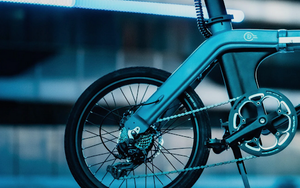Are Electric Mini Bikes Street Legal?
Oct 03, 2024
Electric mini bikes are becoming increasingly popular as eco-friendly, fun, and efficient modes of transport. However, many potential riders are left wondering about their legality on public roads. This article explores the essential aspects of electric mini bikes, the relevant laws, and how to ensure you comply with regulations for safe riding.
Understanding Electric Mini Bikes
What is an Electric Mini Bike?
Electric mini bikes are compact, battery-powered two-wheelers designed for both leisure and commuting. They typically feature a lightweight frame and are powered by an electric motor that allows them to reach a moderate speed. Unlike traditional bicycles, they often come with throttles and pedals, providing an option for manual operation.
These bikes vary widely in design, performance, and size, catering to both casual riders and more experienced enthusiasts. They are particularly appealing for short-distance travel around cities and suburban areas. With the growing emphasis on eco-friendly transportation, electric mini bikes have gained popularity as a sustainable alternative to cars, helping to reduce carbon footprints while offering a fun and efficient way to navigate through congested urban environments.
Moreover, the rise of electric mini bikes has also sparked a vibrant community of riders and enthusiasts. Many cities now host events and meetups where riders can share tips, showcase their custom builds, and participate in friendly competitions. This sense of community not only enhances the riding experience but also fosters a culture of safety and responsibility among users, ensuring that everyone can enjoy the benefits of these innovative machines.
Key Features of Electric Mini Bikes
- Battery Powered: The primary feature is a rechargeable battery, typically lithium-ion, providing a sustainable source of energy.
- Speed and Range: Most electric mini bikes can reach speeds of up to 28 mph, with a range varying from 20 to 40 miles per charge.
- Lightweight Construction: Many models are designed to be lightweight for ease of handling and transport.
- Compact Design: Their smaller size makes them ideal for urban commuting and easier storage.
In addition to these core features, many electric mini bikes come equipped with advanced technology such as regenerative braking systems, which help recharge the battery during rides, and smartphone connectivity that allows riders to track their speed, distance, and battery life.
Some models even include built-in GPS navigation systems, making it easier for riders to explore new routes without the worry of getting lost. As manufacturers continue to innovate, the integration of smart technology into electric mini bikes is expected to enhance the riding experience further, making them not only a practical choice but also a highly enjoyable one.
Check out the Hitway BK2 and the Himo Z16 Electric Bike.

The Legalities of Electric Mini Bikes
Laws on Electric Mini Bikes
In the UK, electric mini bikes fall under the category of "electrically assisted pedal bicycles" (EAPCs) if they meet specific criteria set out by the Department for Transport. If they are not classified as EAPCs, they may be subject to more rigorous vehicle regulations.
According to UK law, for an electric mini bike to be considered an EAPC, it must have pedals that are capable of propelling it, a motor that does not exceed 250 watts, and must not assist the rider above 15.5 mph. If a bike exceeds these limits, it will require registration, insurance, and a valid motorcycle or moped licence to be street legal.
County-Specific Regulations
While federal laws provide a framework, individual counties or regions may have additional regulations concerning electric mini bikes. For instance, local councils may impose restrictions regarding where these bikes can be ridden, such as prohibiting them on certain paths or public spaces.
It's essential to check with local authorities to ensure compliance as laws can differ significantly from one area to another. Riding in a jurisdiction where the bike does not comply with local laws can lead to fines or penalties.

Factors Influencing Street Legality
Speed and Power Limitations
The maximum speed and motor power of electric mini bikes are crucial in determining their legality. As previously noted, bikes must not exceed a motor power of 250 watts or speeds of 15.5 mph without requiring additional licensing. Exceeding these limits can classify the bike as a motor vehicle, subjecting it to stricter regulation.
Riders should be aware that some manufacturers may produce bikes that appear similar to EAPCs but do not meet the legal specifications. Before purchasing an electric mini bike, always confirm the specification details to avoid legal issues.
Safety Equipment Requirements
In the UK, there is currently no mandatory requirement for safety equipment like helmets when riding an electric mini bike classified as an EAPC. However, it is strongly advised to wear suitable protective gear such as a helmet, knee and elbow pads, especially for inexperienced riders. This is because they can be dangerous. In the Netherlands, electric bikes were responsible for 27% of all fatal bicycle accidents in 2017.
Additionally, having lights, reflectors, and bells is highly recommended not only for safety but to comply with guidelines for cycles, as visibility is paramount on public roads.

Consequences of Illegal Use
Potential Legal Penalties
Riding an electric mini bike that does not comply with legal standards can result in several consequences, including fines and potential confiscation of the bike. Authorities may issue fixed penalty notices for riding an unregistered vehicle or riding without proper insurance.
In more severe cases, depending on the violations, riders could face criminal charges. Therefore, it is imperative to fully understand the legal requirements before riding these vehicles in public spaces.
Insurance Implications
For electric mini bikes that fall outside of the EAPC classification, having insurance becomes a legal requirement. Without proper insurance coverage, riders can face substantial financial penalties and personal liability risks in the event of an accident.
Insurers may also refuse to cover any accidents or incidents involving illegal bikes, leaving riders financially responsible for damages caused. Therefore, securing appropriate insurance is vital when considering riding an electric mini bike on public roads.

Making Your Electric Mini Bike Street Legal
Necessary Modifications
To ensure compliance, certain modifications may be necessary for electric mini bikes that don’t meet the legal criteria. These may include upgrading the motor to limit its power to 250 watts or adding pedals if the bike is classified strictly as a cycle.
Additionally, riders can install safety features like lights, reflectors, and horns to adhere to legal riding requirements. Consulting with a professional can provide guidance on required modifications for specific models.
Process of Registration and Licensing
If your electric mini bike is classified as a motor vehicle, the process for making it street legal involves several steps. First, you must register it with the Driver and Vehicle Licensing Agency (DVLA) and obtain the necessary documentation, such as a V5C registration certificate.
Next, securing appropriate insurance is crucial, followed by obtaining a motorcycle or moped licence that permits riding on public roads. Completing these steps will ensure that your electric mini bike can be legally used and may help mitigate potential legal issues.

Conclusion
In conclusion, electric mini bikes can be street legal in the UK, provided they meet specific criteria. Understanding both federal and local regulations is essential in navigating the legal landscape and ensuring safe and compliant riding.






